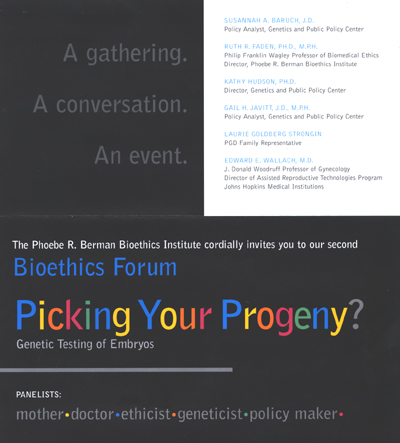
Nice to see the rest of America is okay with what we did. I'd be worried about this country if they didn't. I hope the President and people who run the country are mindful of what the people think, and more importantly of the families who need this kind of medicine.

Later this month Mom is speaking again to tell people what we did and why we did it. I will report back on that.
Genetic Testing of Embryos to Pick “Savior Sibling” Okay with Most Americans
New Survey Explores Attitudes on Preimplantation Genetic Diagnosis (PGD)
Washington, D.C.— A new survey by the Genetics and Public Policy Center at The Johns Hopkins University shows most Americans approve of using genetic testing and selection of embryos to make sure a baby will be a good match to donate blood or tissue to a sick brother or sister. But, they disapprove of selecting an embryo based on whether the baby will be a girl or boy.
Preimplantation genetic diagnosis (PGD) involves the removal and genetic analysis of one or two cells from embryos created through in vitro fertilization. Test results are then used to select embryos to transfer to a woman’s womb to initiate a pregnancy. While PGD was originally developed to prevent transmission of serious diseases, recently it has been used to pick embryos based on sex or suitability as a tissue donor.
To measure public attitudes toward these uses of PGD and other reproductive genetic technologies, the Genetics and Public Policy Center, which is funded by The Pew Charitable Trusts, conducted a detailed survey of 4,005 Americans, the largest to date by far.
The survey showed that 61 percent approve of using PGD to select an embryo that could benefit an ailing sibling, while 33 percent disapprove of this use. In contrast, 57 percent of the respondents disapprove of using PGD to select embryos based on sex.
“There is strong support for using these technologies when there is a health benefit, even when that benefit is for another person, but this support coexists with deep-seated worries about where all these new technologies may be taking us,” said Kathy Hudson, Ph.D., the founder and Director of The Johns Hopkins University Genetics and Public Policy Center.
For example, 80 percent of respondents were concerned that if not regulated, reproductive genetics technologies such as PGD could “get out of control.”


No comments:
Post a Comment